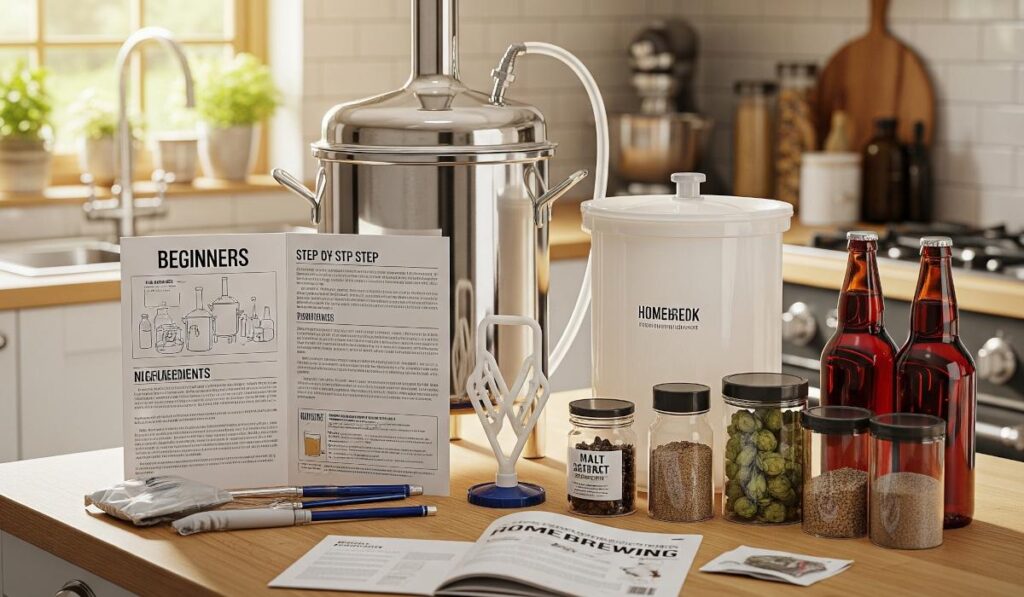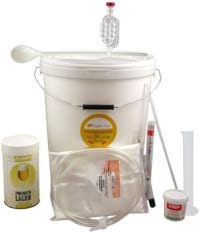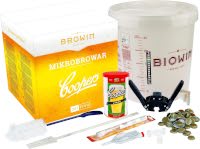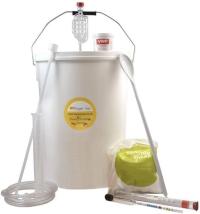Brewing your own beer is easier — and far more satisfying — than you might think. With so many home brew kits for beginners now available in the UK, getting started has never been simpler or more rewarding.

When I first started experimenting with fermentation, I used rosehips plucked from the garden hedge and an old demijohn, and I had no idea what I was doing. That first hedgerow wine? It tasted like firewater, but it planted the seed.
Fast forward a few decades and beer kits have come a long way. They are not only more accessible, but many also rival the quality of good craft brews. Whether you’re motivated by cost savings, a thirst for creativity, or the thrill of mastering a new skill, this guide will walk you through the best beginner-friendly options on the UK market. By the end, you’ll know exactly which starter kit suits your taste, budget and ambition.
What Are Home Brew Beer Starter Kits and Why Should Beginners Use One
The Basics of Home Brewing
Home brew beer starter kits provide all the pre-measured ingredients you need to begin your brewing journey, including malt extract, hops, yeast and water. Designed with beginners in mind, these kits simplify the fermentation process, eliminating the guesswork and technical complexity that can be associated with traditional home brewing. They’re the perfect starting point for anyone who is new to brewing their own beer at home.
When I first transitioned from wine kits to beer, I was confronted with a lot of new terminology — mashing, sparging and trub, for example — and it was overwhelming. However, watching a few step-by-step videos demystified the process, and once I had brewed that first pint, I was hooked.
Why Home Brew Kits Are Perfect for Beginners
Starting with a full homebrew setup can be intimidating. That’s why homebrew kits designed for beginners are such a good starting point. They come pre-measured and pre-packed, and are mostly idiot-proof (I speak from experience). There’s no need to hunt down a list of obscure items from different shops — everything you need arrives in one box. Some beginner kits include basic fermentation vessel equipment.
More importantly, they’re designed to boost your confidence. My own turning point came with a 10-pint Guinness-style kit — I expected the result to be barely drinkable, but it was dark, flavourful, and surprisingly close to the real thing. Even my neighbour, a seasoned brewer, approved of it. That early success spurred me on.
If you’re looking for a beginner-friendly project that doesn’t require mashing or dry hopping, a straightforward home brew cider recipe is a fantastic starting point. Although many kits focus on beer, cider can be an even easier introduction for new brewers.
What to Look for in a Home Brew Kit for Beginners
Must-Have Components
A decent beginner kit should include:
- A fermentation vessel (glass or plastic carboy, bucket or pressure barrel)
- Hydrometer
- Bottles and caps (or a kegging option)
- Cleaning and sanitising tools
- Clear instructions and support
Sanitation, in particular, should not be underestimated. I’ve learned that most of your brewing time will be spent preparing and cleaning, rather than brewing itself. Using a good no-rinse sanitiser like Star San makes life much easier and helps prevent funky flavours.
Beer Style Options
For beginners, ales are usually a safer option than lagers, which require fermentation at cooler temperatures. Having said that, one of my first kits was a lager, and although I struggled to keep the temperature stable (thanks to the unpredictable British summer), the final brew was still refreshing and crisp.
Some kits aim to replicate UK pub favourites, while others offer more adventurous styles. If you have a favourite beer style — such as a hoppy IPA or a smooth bitter — there is probably a kit to match it.
Batch Size – Start Small or Go Big?
Beginner kits often come in two sizes:
- 1 gallon / 4.5L – Great for small kitchens and trial batches
- 5 gallon / 23L – More economical per pint, but takes up more space
I started with smaller batches, which were easier to manage and less painful if anything went wrong. Once I had got the hang of things, scaling up felt natural.
The Best Home Brew Beer Starter Kits in the UK (2025 Update)
Beer Making Starter Kit – Muntons Premium Lager
- Ideal for beginners who want reliable, no-nonsense results.
- What’s included: 25L fermentation bucket, Muntons Premium Lager kit, syphon and steriliser.
- Pros: Trusted UK brand; crisp, clean lager; good instructions.
- Cons: No bottles or caps included.

I’ve always trusted Muntons as a reliable brand, and this kit delivered exactly what I expected: a clean, easy-drinking lager with no fuss. It’s a great introduction to brewing if you’re looking for that classic lager taste. While it’s not the most exciting kit in the world, it gives you the confidence to keep brewing — and sometimes that’s exactly what you need!
Browin Spólka Micro Brewery Brewing Starter Kit
- Ideal for beginners looking for a compact, all-in-one solution.
- What’s included: fermentation vessel, ingredients, accessories and instructions.
- Pros: Unique European design; very compact; complete beginner set.
- Cons: Smaller batch size; less UK-specific guidance.

This one caught my eye for its unusual setup — it’s like a mini-microbrewery in a box! It’s well packaged and perfect if you want to try brewing without committing to a large batch. It’s a great “gateway” kit for experimenting, especially if you’re short on space or just want to see how brewing works before scaling up.
40 pint (5 gallon) cider-making starter kit – John Bull Country Cider
- Ideal for first-time cider makers.
- What’s included: 5-gallon fermentation bucket, John Bull cider kit, yeast, siphon and steriliser.
- Pros: crisp, fresh results; makes a full 40 pints; affordable.
- Cons: Again, bottles are not included.

I was keen to try my hand at making cider for a change of pace, and this kit didn’t disappoint. The end result was light and crisp and went down a little too easily. It’s a fun alternative if you’re looking to branch out from beer — and let’s face it, who doesn’t enjoy a cold pint of cider in the garden?
Tips for Brewing Success as a Beginner
Cleanliness Is Everything
Sanitise everything that comes into contact with your brew. Trust me — even the slightest mistake can ruin a batch. I’ve had one or two brews take on an unpleasant flavour, and nine times out of ten, it was due to poor cleaning.
Temperature Control
I initially underestimated the importance of fermentation temperature. One summer, a brew fermented at a much higher temperature than intended, and the bottles foamed like geysers. The lesson I learned was that a dark corner of the airing cupboard or an insulated box can work wonders.
Patience Pays Off
Among brewers, there’s a saying: ‘Brew it, bottle it, forget it.’ Your beer needs time to mature. I now religiously follow the three-week rule — and yes, the difference in taste is well worth the wait!
Where to Buy Home Brew Kits in the UK
Trusted online retailers:
- TheHomeBrewShop.co.uk
- LoveBrewing.co.uk
- Amazon UK (double-check seller reputation)
Some local garden centres and independent stores also stock kits, so it’s worth checking if you prefer to browse in person.
Please note that some links may be affiliate links. If you choose to purchase an item through one of these links, we may earn a small commission at no extra cost to you. This helps to support the site and create future content.
What’s Next After Your First Brew?
Trying New Styles and Recipes
Once you’ve brewed your first batch of beer, it’s hard to stop! Since then, I’ve tried everything from hazy NEIPAs to chocolate stouts. If you enjoy experimenting like I do, you’ll love delving into the world of hops, specialty grains and adjuncts.
Upgrading Your Kit
Small upgrades can make a big difference. For example, a bottling wand saved me from making a mess. Temperature control tools like a cheap brew belt or a fridge with a thermostat made my results far more consistent. I’m now planning to brew my first Sierra Nevada–style all-grain IPA — it’s a rabbit hole, but a fun one!
FAQs – Home Brew Kits for Beginners in the UK
Q1: How much beer can I make with a home brew kit?
Most standard kits make around 40 pints (23L), though smaller 10-pint kits are also popular.
Q2: How long does the brewing process take from start to finish?
Typically 4–6 weeks including fermentation and bottle conditioning.
Q3: Can I reuse the kit for more brews?
Yes! Most equipment is reusable. You’ll just need new ingredients.
Q4: What’s the easiest style of beer for beginners to brew?
Ales — they ferment at room temperature and are more forgiving than lagers.
Q5: Do I need any additional equipment that’s not in the kit?
Some kits require bottles or a bottle capper — check the listing.
Q6: Is home brewing legal in the UK and can I share or sell my beer?
Home brewing is legal, and sharing is fine. Selling requires a license.
Q7: What’s the difference between extract kits and all-grain brewing?
Extract kits simplify the process. All-grain gives full control but takes more time and gear.
Conclusion
Brewing your own beer at home doesn’t require a degree in chemistry or a garage full of equipment. Thanks to the wide range of beginner-friendly homebrew kits available today, anyone can brew their own beer — and chances are, it’ll taste better than you expected.
So take the plunge! Set aside a weekend. Clean your equipment, follow the instructions and enjoy the process. If your first brew isn’t perfect, don’t worry. Mine certainly wasn’t, but I’ve learnt something new from every batch since then.
Here’s to your first delicious pint of homemade beer – cheers!
